Are Root Canals Bad For You? The Dangers of an Infected Root Canal and Why You Should Say No to a Root Canal
Are Root Canals Bad For You?
To answer the question: "Are root canals bad for you?" it's essential to understand how root canal treatment works, how root canals can
become infected after treatment, and how infected root canals can harm health and cause long-term side effects.
Explaining Root Canal Treatment
Root canal treatment involves removing the soft centre of the tooth—known as the pulp—by drilling a hole in the tooth, removing the
infected pulp, disinfecting the root canals, clearing harmful bacteria, filling the hole, and placing a crown on the tooth. The premise of
root canal treatment is to save a tooth that is infected or decayed by removing the infected materials and thus avoid having it extracted.

The Good: Why Root Canal Treatment is Popular
Millions of people undergo root canal therapy every year in an effort to prevent the loss of teeth that have "died." This common procedure
is promoted by most dentists and endodontists, who are dental specialists limiting their practices to root canals and related problems.
During this procedure, "dead nerve tissue" is removed, and a filling material is placed within a prepared chamber. This chamber housed not
only the nerves but blood vessels and specialized cells for tooth health. In most cases, the obvious infection resolves, and the pain is
eliminated without complications. Many teeth with root canals can remain as functioning components, especially if appropriately restored. It
is not surprising that most dentists and their patients pursue this therapy when indicated. However, there is more than meets the eye
regarding this subject.
The Bad: The Anatomy of Our Teeth
The bad news begins with the anatomy of our teeth. The enamel covers the chewing surfaces of our teeth and is generally what we see inside
our mouths. This layer is very strong, yet only 1 ½ to 2 millimeters thick at the most. It covers dentin, which comprises most of the tooth
volume. A less strong but dense single cell layer called cementum covers the roots of teeth. The pulp chamber is within the body of the
tooth.
The main pulp chamber, generally centered within the body of the tooth and root(s), is not the only tube within our teeth. There can be one
or more "lateral accessory canals" running from the main chamber outward and through the cementum. Additionally, there is a highly
specialized network of microscopic tubes (tubules), designed to supply nutrients to the dentin as long as the tooth is alive. Each of these
tubules begins at the surface of the pulp chamber and extends out to the enamel or cementum surface of the dentin.
These tubules do not interconnect and house extensions of living cells that line the pulp chamber and conduct fluids outward from the living
pulp. The intricacy of this microscopic anatomy simply cannot be appreciated until we realize that each tooth contains approximately 1.5
million tubules! One front tooth with a single root has an estimated 3 miles of tubules!

The Ugly: What Happens in Root Canals When a Tooth Dies
The ugly part of root canals is what happens within these tubules when a tooth dies. As the living cells necrose (rot) within the central
pulp chamber, their extensions also necrose within their tubules. Although root canal therapy should completely obliterate and fill the main
pulp chamber, it is impossible to fill the millions of microscopic tubules.
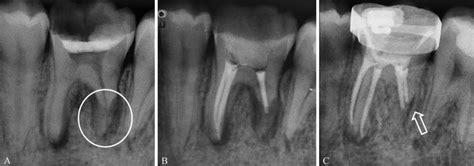
Bacteria from infected teeth or from the dental procedure itself can remain within the tubules, growing and multiplying. Because microbes
can change their form and function in response to a changed microenvironment within the tubules, they can go on living despite the altered
oxygen and food supply. As they do so, they begin to produce various toxic chemicals that have been shown to be harmful to you and me. Some
of these toxins can be especially toxic to specific organs and/or organ systems.
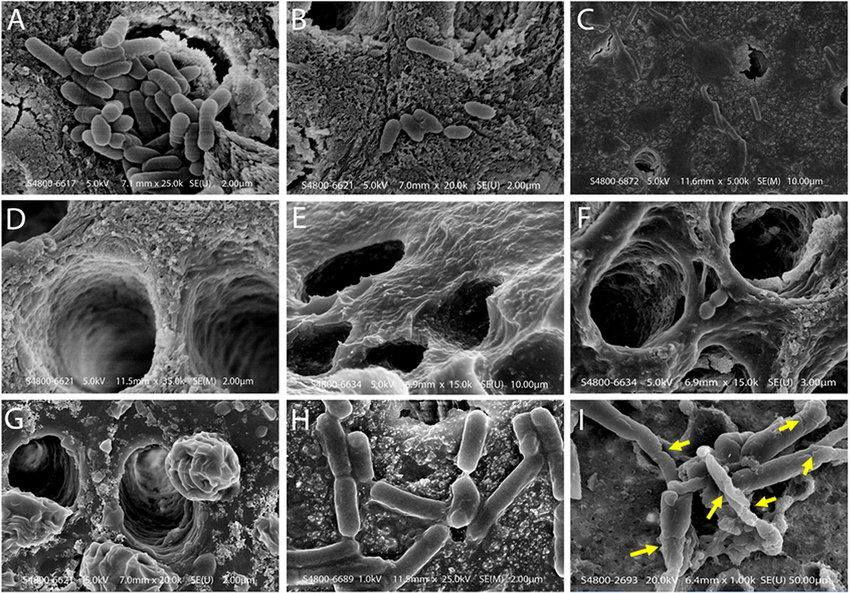
Infected Root Canals - Why Root Canals are Bad For You
While root canal treatment may sound good in theory, it is crucial to understand that it also presents serious health risks and can have
severe unintended consequences. These health risks and consequences arise when root canals become infected, which occurs when the harmful
infection-causing bacteria are not 100% removed during the root canal treatment. When this happens, the bacteria linger and multiply—often
driving chronic inflammation, compromising immune function, and ultimately catalyzing other systemic health issues such as autoimmune
disease, cancer, heart attack, stroke and rheumatoid arthritis.
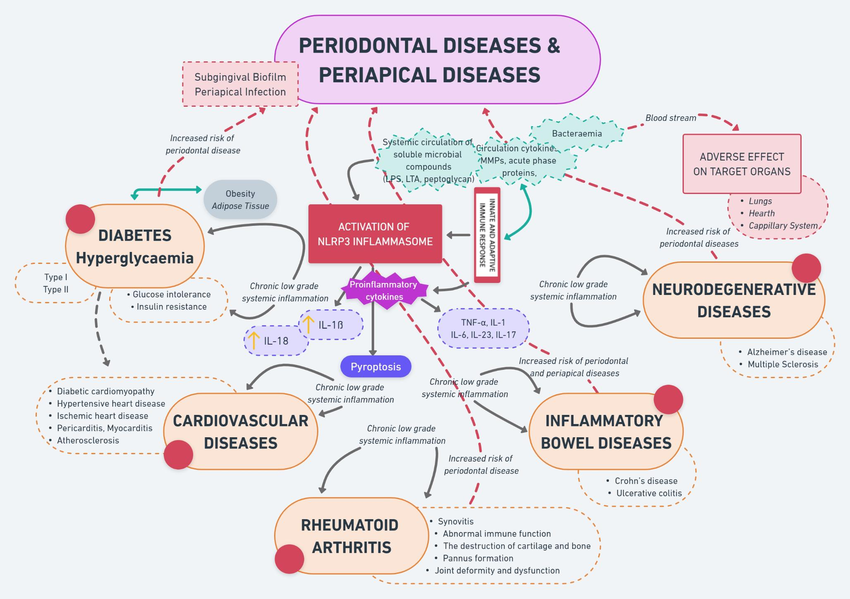
There is much debate between dentists and endodontists as to whether root canals are bad for you, as many believe the probability of root
canal infection is low. All, however, agree on one thing: that infected root canals are bad for you as they present a host of severe health
risks.

How Does a Root Canal Become Infected? Understanding the Anatomy of the Teeth
An infected root canal can result from incomplete cleaning or sealing of the root canal system during treatment. This can easily occur due
to the tooth's complex anatomy, which has roots that contain main canals and thousands of tiny side canals. These canals house an intricate
network of nerves that extend throughout the tooth.
During a root canal treatment, the dentist removes the nerve tissue from the main canals to alleviate pain and infection. However, the side canals are incredibly small and intricate, making it nearly impossible to completely remove all the nerve tissue. Thus, harmful infection-causing bacteria may remain inside the tooth, even after root canal treatment.
Infected Root Canals Explained
Infected root canals often contain necrotic (dead) tissue, inflammatory exudates, and sometimes pulp tissue remnants. These serve as a rich
nutrient source for anaerobic bacteria, which feed on these materials, allowing them to multiply, persist, and excrete toxins. This is the
mechanism by which root canals become infected.
Compounding this is the fact that anaerobic bacteria often form 'biofilms,' which protect the bacteria from the host's immune response. The root canal is also relatively isolated from the systemic immune response, which further allows bacteria and infection to proliferate. This is the process of chronic infection and inflammation
Root Canal Treatment Side Effects
The side effects from root canal treatment are attributed to this chronic infection and inflammation. To manage this inflammation, the lymphatic system surrounding an infected root canal will drain toxins from the area. Excessive and prolonged infection (as with infected root canals) sees these toxins continually pushed into the bloodstream, after which they are deposited in various other organs and systems throughout the body. This catalyses a host of health issues, and is what is responsible for driving root canal treatment side effects.
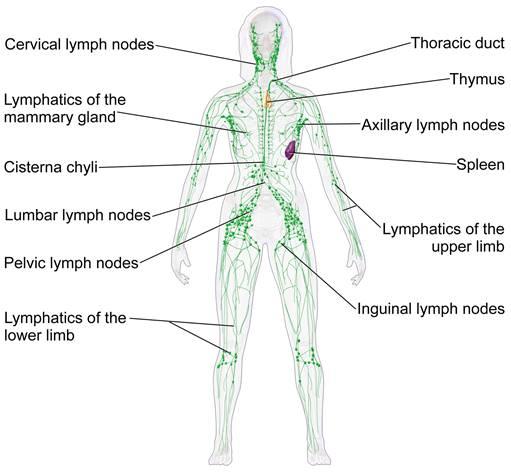
Which Bacteria Lurk in a Dead Tooth?
Studies show that microorganisms are present in all root canal-treated teeth with apical inflammation, indicating a chronic infection. If an
inflammation is visible on an X-ray, the failure rate of the treatment increases due to this chronic infection.
Researchers have identified 75 different bacterial strains in root-treated teeth with apical osteitis. Common bacteria found in and around
dead teeth include:
- Enterococcus faecalis
- Capnocytophaga ochracea
- Fusobacterium nucleatum
- Leptotrichia buccalis
- Gemella morbillorum
- Porphyromonas gingivalis
These bacteria can affect various parts of the body:
- Heart: Four species
- Nervous system: Three species
- Kidneys and brain: Two species
- Maxillary sinus: One species
Toxins
These bacteria produce highly toxic and potentially cancer-causing hydrogen sulfides (Thioether/Mercaptan) from cysteine and methionine.
These toxins can inhibit vital enzymes, leading to various systemic and organic diseases. The inhibition of enzymes in the mitochondria's
respiratory chain has been proven in vitro. Chewing releases these bacteria and their toxins into the lymphatic system, bloodstream, and
entire body.
Immune Response
The healthy pulp, as part of the immune system, plays a crucial role in defending against these bacteria. Chronic bacterial colonization of
the pulp often leads to inflammation of the surrounding bone, activating the immune system continuously. Macrophages release inflammatory
mediators (TNF-alpha, IL-1, growth factors, PGE2, and leukotriene) into the bloodstream, which can promote chronic inflammations and
autoimmune diseases. Additionally, TNF-beta-producing T-lymphocytes are stimulated, which may promote chronic diseases and cancer. TNF-beta
has been linked to an increased risk of postmenopausal breast cancer.
Root Canal Infection Symptoms
The first signs of root canal infection are typically felt or are visible in the mouth. Root canal infection symptoms include:
- Pain
- Toothache
- Abscess
- Bad breath
- Bad taste in the mouth
- Pus discharge
- Swollen tissue
- Tooth discolouration
Long-Term Side Effects Of Root Canals
It may surprise you that root canal infection symptoms and side effects are not confined to the mouth and can be expressed across other
body parts and systems. Herein lies the risk posed by root canal treatments and infected root canals. Long-term side effects of root canals
can arise due to how toxins from root canal infections spread throughout the body. Some of the most notable long-term side effects of root
canals can include:
- Fatigue
- Fever
- Cancer
- Autoimmune diseases
- Rheumatoid arthritis
- Heart disease
- Diabetes
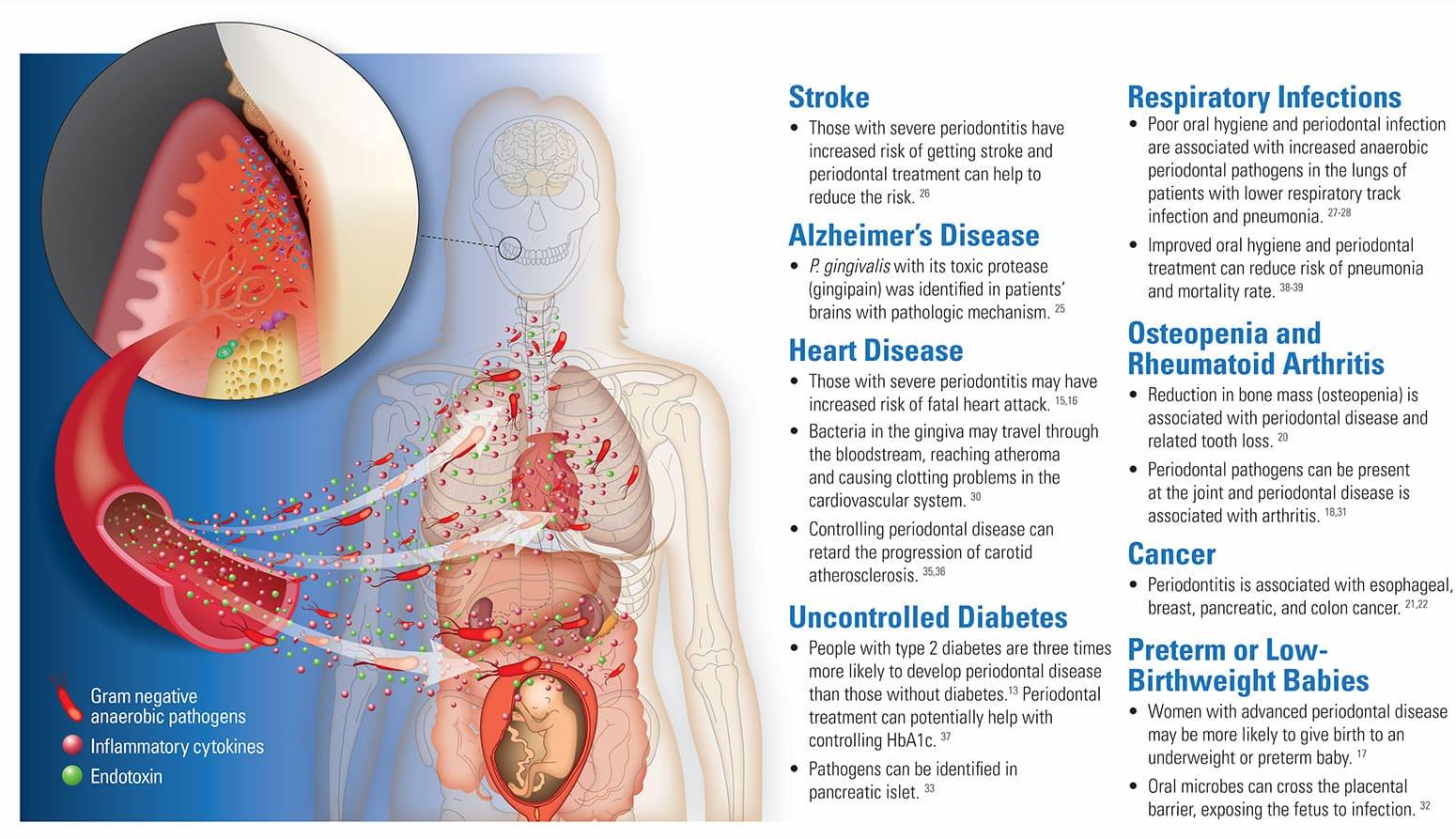
Root Canal Treatment Side Effects According to Dr Weston Price
In the early 1900s, Dr. Weston Price, a pioneering researcher, conducted extensive studies on root canal treatment side effects, particularly how root canal treatment affects systemic health. His research—which involved thousands of patients and tens of thousands of rabbits—demonstrated that teeth with root canals could contribute to serious diseases and even death.
Price's experiments showed that root canal-treated teeth implanted under the skin of rabbits often caused severe infection, leading to the rabbit's death. However, the same was not observed when healthy teeth or sterile objects were implanted under the skin of rabbits.
Ultimately, Dr Price's research indicated that root canal treatment side effects were severe, and that root canal treatment posed a significant risk. He also noted changes in blood chemistry and systemic health following the placement and removal of root canals, further underscoring the potential dangers of this treatment.
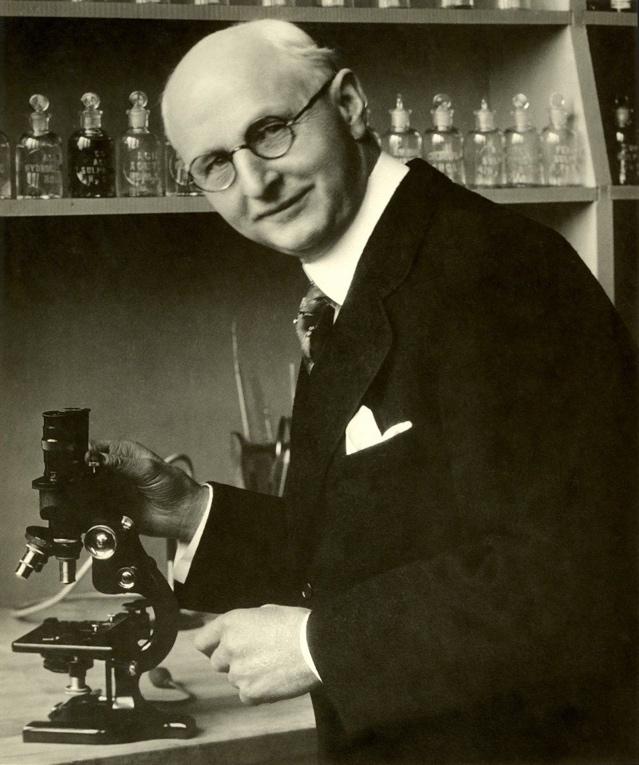
The Dangers of Root Canals - Why We Do Not Offer Root Canal Treatment
The risk of these systemic health issues arising from root canal treatment is precisely why we do not offer root canal treatment at our clinic. While post-treatment root canal infection is not guaranteed, we believe the risk for infection and long-term side effects are too great. We have found that many 'old' root canals with demonstrable infection, even on a radiograph, have evidence of affecting system health.
Are Root Canals Bad for You - A Final Word
So, are root canals bad for you? Well, not always. However, in our view, there is an undeniable risk associated with failed root canal
treatment. For the above reasons, we advocate against root canals and advise people to think twice before opting for root canal treatment.
As we have outlined in a previous blog post, oral toxins are known to be one of the most significant drivers and aggravators of chronic
diseases, and this is highly pertinent to the discussion on root canals and whether root canals are safe.

By understanding the complexities and potential risks associated with root canal treatment, you can make more informed decisions about your
dental health. Always consult with a knowledgeable dentist to explore all your options before proceeding with a root canal.
It can be dangerous removing infected root canals or dental implants without first looking at your Body Chemistry
"If you just take the infected tooth out, and do nothing more, by actual measurement, 63 percent of those people end up with another
autoimmune disease they did not have before they had it removed.
There is a way to do it right and there are ways to do it wrong."
Hal Huggins
If you want to go beyond the symptom and go to the root cause, develop a strategy that goes beyond the teeth. You have to find out what the target is before you pull the trigger. If you are chasing high-level health and wish for a measurable outcome, DO NOT remove a root canal-treated tooth or dental amalgams without first looking at your blood chemistry.
The blood chemistry will tell you what you need to do to stimulate healing.
Just getting rid of the enemy does not restore the nervous system, brain, heart and your immunity.
